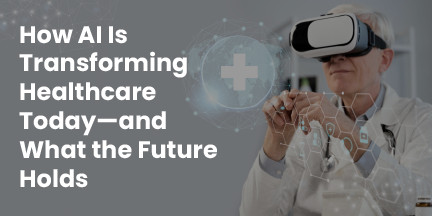In recent years, Artificial Intelligence (AI) has emerged as one of the most transformative forces in healthcare. From enhancing diagnostic accuracy to enabling real-time remote patient monitoring, AI is not only making healthcare smarter and faster but also more personalized. While we are already seeing the benefits, the future holds even more groundbreaking potential.
AI in Healthcare Today
1. Smarter Diagnostics and Medical Imaging
AI is significantly improving the accuracy of medical diagnostics. For example, AI algorithms are helping radiologists detect conditions like cancer, pneumonia, and brain tumors with incredible precision. Google Health’s AI model has even demonstrated greater accuracy than human doctors in detecting breast cancer, highlighting the immense potential for early diagnosis and better outcomes.
2. Predictive Analytics for Better Outcomes
Hospitals and clinics are increasingly leveraging AI to analyze vast amounts of patient data and predict critical health risks—such as heart attacks or sepsis—before they occur. This predictive power enables timely interventions, reducing the risk of complications and ultimately improving patient outcomes.
3. Accelerated Drug Discovery
AI is reshaping the pharmaceutical industry, making drug discovery faster and more cost-effective. DeepMind’s AlphaFold, for instance, is revolutionizing the understanding of protein folding, an essential component of disease research. This breakthrough is speeding up the development of new treatments and bringing promising therapies to market more quickly.
4. Virtual Health Assistants and Chatbots
AI-powered virtual assistants are already providing patients with basic medical information, helping with appointment scheduling, and even sending medication reminders. These innovations allow healthcare professionals to focus on more complex tasks while enhancing patient engagement and convenience.
5. Precision in Surgery
AI-assisted robotic surgeries are transforming the surgical landscape. By offering enhanced precision, smaller incisions, and faster recovery times, AI is making complex procedures less invasive and safer for patients. Surgeons are now able to rely on AI to enhance their capabilities during operations.
Current Challenges and Ethical Concerns
Despite its vast potential, AI in healthcare is not without challenges:
-
Data Privacy & Security: Protecting sensitive patient data remains a significant concern. As AI relies on massive datasets, securing this information is paramount.
-
Algorithmic Bias: There is a risk of AI systems perpetuating existing biases if the data used to train them isn’t diverse or representative of all populations.
-
Regulatory Approval: Trust from healthcare professionals and regulatory bodies is crucial. Establishing AI systems that meet stringent medical standards is necessary for widespread adoption.
The Future of AI in Healthcare
1. Personalized Treatment Plans
In the future, AI will enable highly personalized treatment plans based on individual genetic profiles. This approach will help reduce adverse reactions to medications and tailor therapies to maximize their effectiveness, revolutionizing the way we think about patient care.
2. Remote Monitoring and Telemedicine
The integration of smart wearables and remote sensors with AI will allow healthcare providers to continuously monitor a patient's vitals in real time. This technology will enable earlier interventions, ensuring better care and reducing hospital visits, all while enhancing convenience for patients.
3. AI in Mental Health
AI is already making strides in mental health care, with chatbots and AI therapists helping those dealing with anxiety and depression. As AI evolves, future systems may provide even more nuanced emotional support, offering a lifeline for those in need of accessible mental health care.
4. Global Access to Healthcare
AI-powered mobile diagnostics and remote consultations hold the promise of bridging the healthcare gap in underserved regions and rural areas. With AI, healthcare can reach places where it has historically been difficult to deliver high-quality care, making medical services more accessible to everyone.
5. Autonomous Healthcare Systems
Looking further ahead, AI has the potential to revolutionize healthcare by automating entire workflows. This could include tasks such as initial diagnoses, treatment recommendations, and even patient management, all with minimal human oversight. These systems could free up healthcare professionals to focus on more complex, human-centered aspects of care.
Conclusion
AI is not here to replace doctors; it is here to empower them. By combining human intuition with machine precision, AI is helping create a smarter, faster, and more personalized healthcare system. The key to success lies in its ethical, responsible, and inclusive implementation. The healthcare revolution is already underway, and AI is at the forefront, shaping the future of medicine for the better.

